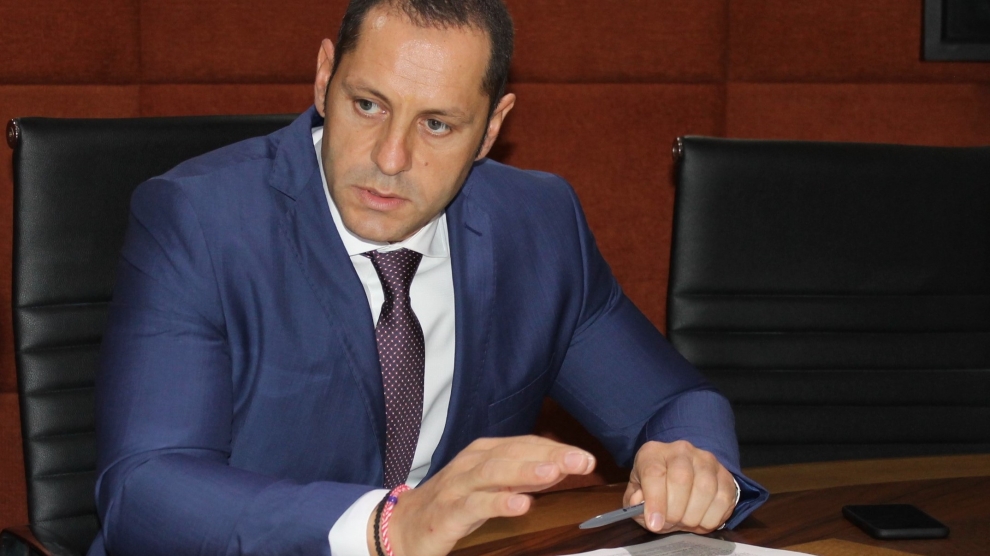Andrew Wrobel (AW): In April 2016, I spoke to Bojidar Loukarsky, the then minister of economy, who told me that Bulgaria was an island of stability in Europe. Is it still?
Alexander Manolev (AM): It is, and several facts strongly confirm this statement. First of all, the political stability — the last parliamentary elections a year ago confirmed the credibility of the largest political party in Bulgaria, which has a stable majority and a clear horizon of governance. Moreover, the main priority is to maintain macroeconomic and fiscal stability to create conditions for economic growth. I can say that this is a trend we have maintained in recent years. Preliminary data for GDP in 2017 demonstrate growth of 3.6 per cent in 2017 and 3.9 per cent in 2016. The 2017 current account balance was positive at about 2 billion euros and at the end of January 2018 it is about 140 million euros. There has also been a steady decline in unemployment since 2015, with a rate of 7.1 per cent in 2017 and it keeps falling. So I can say that the good macroeconomic indicators and political stability are key factors in attracting more investment and guaranteeing sustainable economic growth.
But we are not satisfied with these achievements. Today we are faced with many challenges, not only at national level, but also internationally — globalisation, declining demographics, migration, the need for timely measures on environmental protection, increasing resource constraints, as well as the need to introduce technical and technological innovations. Global changes in recent years and advancement of partners and competitors call for decisive action and even closer cooperation to ensure the future in the coming decades. When we talk about stability, we do not mean only Bulgaria, but also the entire region. One of the priorities of the Bulgarian Presidency of the Council of the EU has been security and stability in the Western Balkans. And our country strives to be an active participant in the integration process and strengthening the cooperation among all countries in the region. The aim is to ensure the connectivity of the Western Balkan countries – transport, energy, educational and digital – consistent with our continuing efforts over the years for their European perspective.
AW: Before I continue with the challenges, let me circle back to the 3.6 per cent growth. What is your forecast for 2018 like?
AM: Indeed, the Bulgarian economy reported 3.6 per cent real growth in 2017, with an expected 4 per cent in the September 2017 forecast. This was due to the stronger negative contribution of net exports, while domestic demand performed better than expected. According to the Ministry of Finance forecast, GDP growth is expected to accelerate to 3.9 per cent in 2018, with domestic demand continuing to be the driving force.
GDP growth rates are expected to remain relatively high in the future. Consumption is expected to rise by 5 per cent and the growth of fixed capital investment is expected to reach 10 per cent. Similarly, the forecast for 2020-2021 is good. Of course, we have GDP growth, but we must strive for even better results to catch up with Western European countries.
AW: So we have the growing economy but when we look at the business climate it seems the situation has deteriorated. In the 2017 Doing Business ranking the country came 39th and in 2018 Bulgaria ranked 50th. Has the government introduced any necessary reforms?
AM: Allow me disagree with you. This year the ranking methodology has been changed, so the results should not be compared automatically with the previous year. Bulgaria is performing well in cross-border trade indicators (21st place), protection of minority shareholders (24th place), execution of contracts (40th place) and loans (42nd place).
AW: But the methodology changes frequently and some countries go up or down.
AM: Of course there are lower score indicators and we are aware of those issues. We face many challenges and yet I think we are progressing and achieving better results. And this is confirmed by a number of surveys and studies that various organisations and embassies undertake with foreign businesses in Bulgaria. For example, according to German-Bulgarian Chamber of Commerce research, over 90 per cent of German companies in Bulgaria would invest again in our country if they had this opportunity. Another survey, made by the Embassy of Sweden and processed in their country, among their businesses, shows that 74 per cent of Swedish companies in Bulgaria are planning to expand their operations over the next three years and 94 per cent of the existing investors will maintain or expand their activity here. Similar data is available for Italian businesses and third-country companies. For me this is the most credible indicator of the business environment in Bulgaria and reflective of the attitude of foreign investors.
However, as I said, it does not mean there is nothing to improve. On the contrary, we maintain relationships with business and we aim to constantly improve the environment and solve the problems they face. As an example, I can point out that reducing the administrative burden is a top priority not only for the ministry of economy but also for the whole government. We have made a review of all services and regimes our ministry is responsible for, and we made changes affecting 60 per cent of them such as reducing or dropping fees; reduction of required documents; digitalisation of services. Equally strong measures are taken throughout the administration – ministries, agencies, etc. I can talk a great deal about the things we do — the support for small and medium-sized enterprises, attracting investment in value-added sectors of the economy, the promotion of implementation and development of innovation. Many of these priorities are supported by the matching budgets. So I think the business environment in Bulgaria is constantly improving and with the joint efforts of the private sector and the state, I hope we will achieve even better results.
AW: In January 2017, Bulgaria celebrated its 10th anniversary as an EU member state. Do you think people’s expectations related to the EU membership have been met?
AM: I think there is no EU state where people’s expectations regarding the membership have been completely fulfilled. Moreover, the EU is a living organism that continues to grow and improve. As far as Bulgaria is concerned people’s expectations generally about the transition to democracy and particularly joining the EU were higher in terms of the pace of the reforms. Bulgarians were not prepared for the extended process and the high price which this journey required. Nevertheless, EU membership was a motivating and unifying driver for our society which we accomplished relatively quickly. The macroeconomic indicators prove we have achieved remarkable results after accession – the GDP has doubled; exports have reached record heights and our economy has attracted billions of investment. The outcome for a large number of our companies was their successful integration into the value added supply chains within the EU.
A good example is the establishment of the Bulgarian automotive parts and components which is interconnected with the EU automotive industry. Bulgaria’s exports have increased over 30 times after the year 2000 and more than 10 times following the accession with 80 per cent destined to the EU.
Another compelling example is the apparel industry which has started its integration within EU supply chains since the beginning of the 21st century. It is a primary driver for our exports and improved competitiveness with 90 per cent of the production aimed at EU markets. Bulgaria benefits greatly from the EU’s Cohesion Policy which has a major impact on our economy and the country as whole. But these outcomes are still to be felt in further increasing individual incomes and wealth.
This continues to be our primary goal which will improve people’s satisfaction with the membership. However Bulgarians are optimistic about the EU. A recent study by the EU Representation in Bulgaria marking the decade of our accession showed that since 2007 the approval of EU membership has maintained its level of 50 per cent with 16 per cent dissatisfaction and 34 per cent undecided.
AW: I promised to come back to the challenges, and demographics is a real issue in Bulgaria. The population has already fallen and base-line scenarios predict a further decline by approximately 7 per cent by 2030. How do you see that?
AM: Indeed, the negative EU trends for ageing population and declining birth rates are very prominent in Bulgaria. Tackling those issues is of primary importance for the government which takes multi-faceted measures in reducing the brain drain, attracting emigrants to return home, encouraging young entrepreneurs, sustainable economic development, maintain the intellectual capacity and well-being of the people.
It is our priority to strengthen the ties between education and the labour market by introducing and implementing dual education. We encourage employers to engage in defining the curriculums to reflect their regional needs so that schools could meet those expectations. As such we aim to enhance balanced regional development and create regional sector specialisation. We have drafted a contract between employers and students so that their employment is guaranteed during education and after graduation. These measures correspond with people’s aspirations to find work closer to their homes and relatives. But if some sectors are underdeveloped and underpaid it is only natural for people to look for professional opportunities. We are trying to reverse this trend.
Our National Strategy for SME Promotion 2014-2020 features a special focus on Entrepreneurship by aiming to support young entrepreneurs and entrepreneurship education in schools. We have a longstanding tradition as a Ministry to deliver projects which stimulate entrepreneurs to start their own companies and engage with innovation. We also allocate financial resources to educate students on the benefits and mechanisms of starting their own business. We also manage the EU Operational Programme Competitiveness and Innovation which in 2018 will provide 35 million euros to reinforce start-ups. The increase of Bulgaria’s competitiveness will support our efforts to reverse the negative trends we have discussed.

AW: I also need to ask you about corruption. This year’s Corruption Perception Index ranks Bulgaria 43rd. That doesn’t seem to have changed, does it?
AM: This is again a top priority for the government and a number of specific actions have been taken over the last year, many of which in line with the recommendations of the European Commission’s Co-operation and Evaluation Mechanism. A package of legislative changes has been adopted. We have also developed a National Strategy for Prevention and Counteraction to Corruption, which envisages building an effective system of anti-corruption bodies and units, strengthening the capacity of the institutions and improving the inter-institutional cooperation.
A Law on Counteracting Corruption and the Removal of Unlawfully Acquired Property, which creates an effective mechanism for counteracting high-level corruption, has already been adopted. According to its provisions, a centralised anti-corruption body was established. The Code of Criminal Procedure has also been amended and detailed as the Special Criminal Court will now address corruption offences.
I’m not a specialist on the subject, of course, and I do not want to go into details, but since the formation of the government, many decisive actions have been undertaken. I also want to assure all potential investors that the institutions in Bulgaria will react to every signal and even to the least suspicion of exerting pressure or any attempt for corrupt practices.
AW: Finally, what generally makes Bulgaria attractive for investors? What will be your message for investors?
AM: There are quite a few of them. Bulgaria has the lowest tax rates in the EU — a 10 per cent total direct tax rate, a 5 per cent dividend tax and the lowest operating costs in Europe. Computers, software, new equipment and assets have a 50 per cent annual depreciation. Good labour qualifications are highly appreciated by foreign investors. At the same time, we have the lowest operational costs and our country has proven to be politically and economically stable. A number of incentives are also offered under the Investment Promotion Act, and each serious company receives personalised service from the Bulgarian Investment Agency throughout the whole investment process.
Investors appreciate the beneficial environment. Suffice it to say that over the last ten years, according to Bulgarian National Bank, over 29 billion euros have been invested in Bulgaria. The first among foreign investors is the Netherlands (with over 6 billion euros), followed by Austria (with nearly 3 billion euros), Germany (over 2 billion euros) and Greece (1.9 billion euros). In other words, a very solid base has been created in our country, which we need to continue to improve.
In line with the objectives of the Europe 2020 Strategy for sustainable growth driven by knowledge and innovation, the main objectives of Bulgaria’s investment policy are to increase investments for technological development in high value-added manufacturing and services and to generate new high-productivity jobs. We aim to undertake integrated counteraction to negative trends in investment activity and employment. We strive to promote industrial zones actively as value-added locations for potential investors. Most of them are managed by the state through a national company, and this provides additional security for companies.
As I said, with investments we also try to develop what we have achieved so far. Bulgaria has the fastest growing ICT sector in Southeastern Europe, and we are expecting these professionals to create the world we will live in tomorrow. That is why we must do our best to retain these experts in our country and educate their successors. There are a lot of changes in the service sector and we achieve top rankings along with the best outsourcing locations in Europe. And let me point out that this is also a sector of the future that will be driven much more by knowledge resources than the low cost of raw materials. Mechanical engineering creates jobs for thousands of people in Bulgaria, and the sector is expected to grow in the next years due to constantly evolving and intelligent technologies. Undoubtedly the automotive industry is one of the fastest growing sectors of the Bulgarian economy. A lot of interesting things are going to happen in this sector, and many of them are related to high technology. A lot of other sectors also deserve to be mentioned, including electronics. •






Add Comment